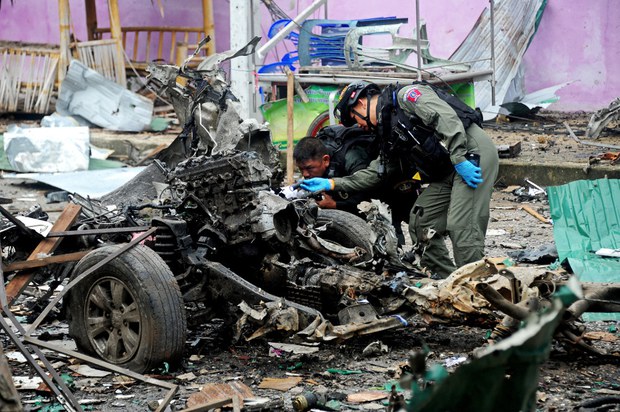Thai Deep South: Government, Rebels to Meet Next Month
2016.08.23
Pattani, Thailand and Washington
 Members of a bomb squad inspect the site of a car-bombing by suspected insurgents in Sungai Kolok, a district in the Thai Deep South province of Narathiwat, June 26, 2016.
Members of a bomb squad inspect the site of a car-bombing by suspected insurgents in Sungai Kolok, a district in the Thai Deep South province of Narathiwat, June 26, 2016.
Delegations representing Thailand and southern rebel groups will likely meet in Kuala Lumpur in early September to resume informal peace talks, well-placed sources on both sides told BenarNews.
The talks, aimed ultimately at ending a long-running separatist insurgency in the Thai Deep South, stalled nearly four months ago when the Thai side declined to sign off on ground rules or Terms of Reference (TOR) for future negotiations, according to the rebel side.
Sub-committees from both sides met in mid-August to discuss new terms, said the sources who declined to share more details.
“Both technical teams made significant progress in the TOR discussion on 16/8/16 through a compromise approach,” Abu Hafiz Al-Hakim, a spokesman for MARA Patani, a panel representing rebel groups and factions, told BenarNews.
“We are set to kick start the process formally soon,” he said, adding that neighboring Malaysia, which has been brokering peace efforts in the Deep South, was to confirm the date of the next meeting in the Malaysian capital.
The meeting has tentatively been set for Sept. 1 or 2, Hafiz said.
A source within the Internal Security Operations Command, which oversees military operations across the Deep South, gave similar information.
“After the sub-committees agreed on the TOR, next, there will be a full delegate talk, tentatively on Sept. 2. Malaysia will be the facilitator,” the source told BenarNews on condition of anonymity.
‘They must stop inciting violence’
In Bangkok on Tuesday, Prime Minister Prayuth Chan-o-cha, who heads Thailand’s military government, told reporters that he had ordered officials to consider a date for talks with the rebels.
“There is a tentative date and the security section is considering it... If [the dissidents] are sincere they must stop inciting violence and not use it to force Thailand to speed up talks,” he said after a cabinet meeting at Government House.
When the talks faltered in late April, Gen. Aksara Kerdpol, the head of the Thai delegation, said a limited ceasefire had to be in place before Thailand could agree to the terms of reference.
The setback came days after a top Thai negotiator, Lt. Gen. Nakrob Boonbuathong, who had been involved in the peace process since it began in 2013 under a civilian-led government, was removed from his role in current informal talks.
Meanwhile, lethal bombings and roadside shootings blamed on insurgents have continued. Deadly bombings rocked areas frequented by tourists in Thailand’s upper south on Aug. 11-12, and officials have linked those attacks to at least 20 people from the Deep South.
The last round of official peace talks, which started before the junta seized power two years ago, petered out after Hassan Bin Toyib, the lead negotiator of Barisan Revolusi Nasional (BRN), the largest and most heavily armed of the southern rebel groups, appeared in an online video in December 2013. In it, he listed a set of rebel demands, including that the Thai government recognize the sovereignty of the “Patani Malay Nation” – a reference to
Thailand’s predominantly Muslim and Malay-speaking southern border region, otherwise known as the Deep South.
Thailand’s Deep South encompasses Pattani, Yala, and Narathiwat provinces, and four districts of Songkhla. A separatist insurgency has simmered in the Deep South since the 1960s. Since it reignited in 2004, more than 6,500 people have been killed.
‘Pessimistic’
The bombings that killed four at tourist hotspots earlier this month occurred days after a majority of Thais voted in favor of a new constitution that would cement military control over Thailand’s political institutions and usher in general election sometime next year.
At least 60 percent of people who cast ballots across the Deep South voted against the charter.
“Even if the two sides meet, I am really pessimistic,” Zachary Abuza, an expert on the Deep South and professor at the National War College in Washington, told BenarNews on Tuesday.
“The charter that was just approved in that shambolic referendum, completely precludes any devolution of power or regional autonomy. The enshrinement of Buddhist nationalism is, furthermore, an anathema to the interests of the Malay community,” he said, adding, “The Thai military's position has always been to degrade the insurgency to the point that they could ascribe the violence to mere criminality without having to make any significant concessions in a peace process.”
Rapee Mama in Narathiwat, Thailand and Imran Vittachi in Washington contributed to this report.







